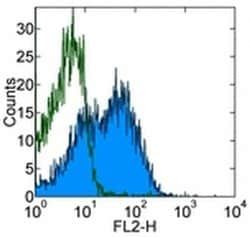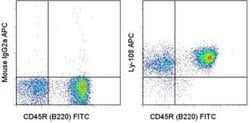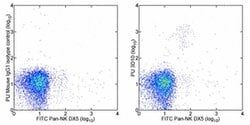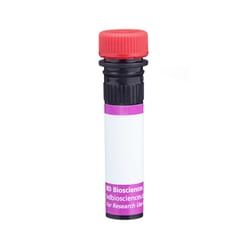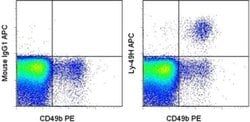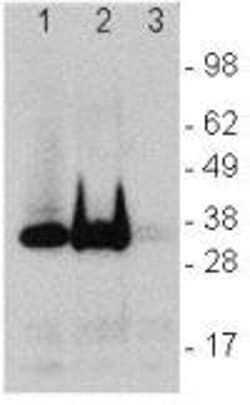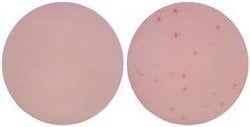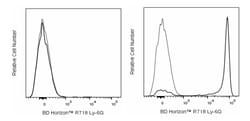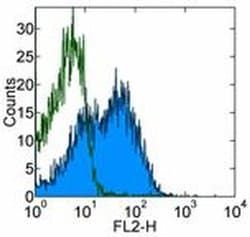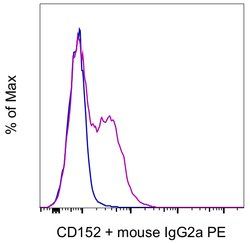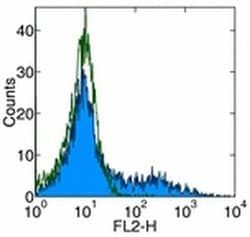50-129-07
Ly-108 Monoclonal Antibody (eBio13G3-19D (13G3-19D)), eBioscience™, Invitrogen™
Manufacturer: Invitrogen
Select a Size
| Pack Size | SKU | Availability | Price |
|---|---|---|---|
| Each of 1 | 50-129-07-Each-of-1 | In Stock | ₹ 28,391.00 |
50-129-07 - Each of 1
In Stock
Quantity
1
Base Price: ₹ 28,391.00
GST (18%): ₹ 5,110.38
Total Price: ₹ 33,501.38
Antigen
Ly-108
Classification
Monoclonal
Concentration
0.5 mg/mL
Formulation
TBS with 0.09% sodium azide; pH 8.0
Gene Accession No.
Q9ET39
Gene Symbols
SLAMF6
Purification Method
Affinity chromatography
Regulatory Status
RUO
Gene ID (Entrez)
30925
Content And Storage
4° C
Form
Liquid
Applications
Flow Cytometry, Immunoprecipitation, Western Blot
Clone
eBio13G3-19D (13G3-19D)
Conjugate
Unconjugated
Gene
SLAMF6
Gene Alias
Activating NK receptor; CD352; KAL1; KAL1b; KALI; KALIb; Ly108; Lymphocyte antigen 108; natural killer-, T- and B-cell antigen; NK-T-B-antigen; NTBA; NTB-A; NTBA receptor; RGD1561848; SF2000; SLAM family member 6; Slamf6; UNQ6123/PRO20080
Host Species
Mouse
Quantity
100 μg
Primary or Secondary
Primary
Target Species
Mouse
Product Type
Antibody
Isotype
IgG2a κ
Related Products
Description
- Description: The eBio13G3-19D monoclonal antibody reacts with mouse Ly108, the mouse homologue of human SLAMF6 (signaling lymphocyte activation molecule family member 6)
- Mouse Ly108 is also known as NTB-A (NK cell, T cell, B cell antigen), and is expressed on NK, T cells, and B cells
- Engagement of the Ly108 receptor enhances NK cell activity and expression of IFN-gamma, and contributes to the inability of NK cells to kill Epstein Barr virus-infected B cells in X-linked lymphoproliferative disease
- CD4+ T cells from Ly108 knock-out mice exhibit diminished ability to produce IL-4 and defective neutrophil functions
- Staining has not revealed any strain differences between C57BL/6 and BALB/c mice
- Other strains have not been tested
- Applications Reported: This eBio13G3-19D (13G3-19D) antibody has been reported for use in flow cytometric analysis, immunoprecipitation, and immunoblotting (WB)
- Applications Tested: This eBio13G3-19D (13G3-19D) antibody has been tested by flow cytometric analysis of mouse splenocytes and thymocytes
- This can be used at less than or equal to 0.5 μg per test
- A test is defined as the amount (μg) of antibody that will stain a cell sample in a final volume of 100 μL
- Cell number should be determined empirically but can range from 10^5 to 10^8 cells/test
- It is recommended that the antibody be carefully titrated for optimal performance in the assay of interest
- Ly108 is the mouse homologue of human SLAMF6 (signaling lymphocyte activation molecule family member 6)
- Mouse Ly108 is expressed on NK, B cells, and T cells
- Activation of Ly108 receptor enhances NK cell activity and IFN-gamma expression.
Compare Similar Items
Show Difference
Antigen: Ly-108
Classification: Monoclonal
Concentration: 0.5 mg/mL
Formulation: TBS with 0.09% sodium azide; pH 8.0
Gene Accession No.: Q9ET39
Gene Symbols: SLAMF6
Purification Method: Affinity chromatography
Regulatory Status: RUO
Gene ID (Entrez): 30925
Content And Storage: 4° C
Form: Liquid
Applications: Flow Cytometry, Immunoprecipitation, Western Blot
Clone: eBio13G3-19D (13G3-19D)
Conjugate: Unconjugated
Gene: SLAMF6
Gene Alias: Activating NK receptor; CD352; KAL1; KAL1b; KALI; KALIb; Ly108; Lymphocyte antigen 108; natural killer-, T- and B-cell antigen; NK-T-B-antigen; NTBA; NTB-A; NTBA receptor; RGD1561848; SF2000; SLAM family member 6; Slamf6; UNQ6123/PRO20080
Host Species: Mouse
Quantity: 100 μg
Primary or Secondary: Primary
Target Species: Mouse
Product Type: Antibody
Isotype: IgG2a κ
Antigen:
Ly-108
Classification:
Monoclonal
Concentration:
0.5 mg/mL
Formulation:
TBS with 0.09% sodium azide; pH 8.0
Gene Accession No.:
Q9ET39
Gene Symbols:
SLAMF6
Purification Method:
Affinity chromatography
Regulatory Status:
RUO
Gene ID (Entrez):
30925
Content And Storage:
4° C
Form:
Liquid
Applications:
Flow Cytometry, Immunoprecipitation, Western Blot
Clone:
eBio13G3-19D (13G3-19D)
Conjugate:
Unconjugated
Gene:
SLAMF6
Gene Alias:
Activating NK receptor; CD352; KAL1; KAL1b; KALI; KALIb; Ly108; Lymphocyte antigen 108; natural killer-, T- and B-cell antigen; NK-T-B-antigen; NTBA; NTB-A; NTBA receptor; RGD1561848; SF2000; SLAM family member 6; Slamf6; UNQ6123/PRO20080
Host Species:
Mouse
Quantity:
100 μg
Primary or Secondary:
Primary
Target Species:
Mouse
Product Type:
Antibody
Isotype:
IgG2a κ
Antigen: CD152 (CTLA-4)
Classification: Monoclonal
Concentration: 0.5 mg/mL
Formulation: PBS with 0.09% sodium azide; pH 7.2
Gene Accession No.: P09793
Gene Symbols: CTLA4
Purification Method: Affinity chromatography
Regulatory Status: RUO
Gene ID (Entrez): 12477
Content And Storage: 4° C
Form: Liquid
Applications: Flow Cytometry, Immunoprecipitation
Clone: UC10-4B9
Conjugate: Unconjugated
Gene: CTLA4
Gene Alias: ALPS5; CD; CD152; CD152 antigen; CD152 isoform; CD152 protein; CD152 protein precursor; celiac disease 3; CELIAC3; Ctla4; CTLA-4; cytotoxic T lymphocyte associated antigen 4 short spliced form; cytotoxic T-lymphocyte associated protein 4; cytotoxic T-lymphocyte protein 4; cytotoxic T-lymphocyte protein 4 isoform CTLA4-TM; cytotoxic T-lymphocyte-associated antigen 4; cytotoxic T-lymphocyte-associated protein 4; cytotoxic T-lymphocyte-associated serine esterase-4; EGK_04712; GRD4; GSE; ICOS; IDDM12; insulin-dependent diabetes mellitus 12; ligand and transmembrane spliced cytotoxic T lymphocyte associated antigen 4; Ly-56; sCTLA4; soluble form; transmembrane form
Host Species: Armenian Hamster
Quantity: 100 μg
Primary or Secondary: Primary
Target Species: Mouse
Product Type: Antibody
Isotype: IgG
Antigen:
CD152 (CTLA-4)
Classification:
Monoclonal
Concentration:
0.5 mg/mL
Formulation:
PBS with 0.09% sodium azide; pH 7.2
Gene Accession No.:
P09793
Gene Symbols:
CTLA4
Purification Method:
Affinity chromatography
Regulatory Status:
RUO
Gene ID (Entrez):
12477
Content And Storage:
4° C
Form:
Liquid
Applications:
Flow Cytometry, Immunoprecipitation
Clone:
UC10-4B9
Conjugate:
Unconjugated
Gene:
CTLA4
Gene Alias:
ALPS5; CD; CD152; CD152 antigen; CD152 isoform; CD152 protein; CD152 protein precursor; celiac disease 3; CELIAC3; Ctla4; CTLA-4; cytotoxic T lymphocyte associated antigen 4 short spliced form; cytotoxic T-lymphocyte associated protein 4; cytotoxic T-lymphocyte protein 4; cytotoxic T-lymphocyte protein 4 isoform CTLA4-TM; cytotoxic T-lymphocyte-associated antigen 4; cytotoxic T-lymphocyte-associated protein 4; cytotoxic T-lymphocyte-associated serine esterase-4; EGK_04712; GRD4; GSE; ICOS; IDDM12; insulin-dependent diabetes mellitus 12; ligand and transmembrane spliced cytotoxic T lymphocyte associated antigen 4; Ly-56; sCTLA4; soluble form; transmembrane form
Host Species:
Armenian Hamster
Quantity:
100 μg
Primary or Secondary:
Primary
Target Species:
Mouse
Product Type:
Antibody
Isotype:
IgG
Antigen: CD152 (CTLA-4)
Classification: Monoclonal
Concentration: 0.5 mg/mL
Formulation: PBS with 0.09% sodium azide; pH 7.2
Gene Accession No.: P16410
Gene Symbols: CTLA4
Purification Method: Affinity chromatography
Regulatory Status: RUO
Gene ID (Entrez): 1493, 705673
Content And Storage: 4° C
Form: Liquid
Applications: Flow Cytometry, Functional Assay, Neutralization
Clone: 14D3
Conjugate: Unconjugated
Gene: CTLA4
Gene Alias: ALPS5; CD; CD152; CD152 antigen; CD152 isoform; CD152 protein; CD152 protein precursor; celiac disease 3; CELIAC3; Ctla4; CTLA-4; cytotoxic T lymphocyte associated antigen 4 short spliced form; cytotoxic T-lymphocyte associated protein 4; cytotoxic T-lymphocyte protein 4; cytotoxic T-lymphocyte protein 4 isoform CTLA4-TM; cytotoxic T-lymphocyte-associated antigen 4; cytotoxic T-lymphocyte-associated protein 4; cytotoxic T-lymphocyte-associated serine esterase-4; EGK_04712; GRD4; GSE; ICOS; IDDM12; insulin-dependent diabetes mellitus 12; ligand and transmembrane spliced cytotoxic T lymphocyte associated antigen 4; Ly-56; sCTLA4; soluble form; transmembrane form
Host Species: Mouse
Quantity: 100 μg
Primary or Secondary: Primary
Target Species: Human, Rhesus Monkey
Product Type: Antibody
Isotype: IgG2a κ
Antigen:
CD152 (CTLA-4)
Classification:
Monoclonal
Concentration:
0.5 mg/mL
Formulation:
PBS with 0.09% sodium azide; pH 7.2
Gene Accession No.:
P16410
Gene Symbols:
CTLA4
Purification Method:
Affinity chromatography
Regulatory Status:
RUO
Gene ID (Entrez):
1493, 705673
Content And Storage:
4° C
Form:
Liquid
Applications:
Flow Cytometry, Functional Assay, Neutralization
Clone:
14D3
Conjugate:
Unconjugated
Gene:
CTLA4
Gene Alias:
ALPS5; CD; CD152; CD152 antigen; CD152 isoform; CD152 protein; CD152 protein precursor; celiac disease 3; CELIAC3; Ctla4; CTLA-4; cytotoxic T lymphocyte associated antigen 4 short spliced form; cytotoxic T-lymphocyte associated protein 4; cytotoxic T-lymphocyte protein 4; cytotoxic T-lymphocyte protein 4 isoform CTLA4-TM; cytotoxic T-lymphocyte-associated antigen 4; cytotoxic T-lymphocyte-associated protein 4; cytotoxic T-lymphocyte-associated serine esterase-4; EGK_04712; GRD4; GSE; ICOS; IDDM12; insulin-dependent diabetes mellitus 12; ligand and transmembrane spliced cytotoxic T lymphocyte associated antigen 4; Ly-56; sCTLA4; soluble form; transmembrane form
Host Species:
Mouse
Quantity:
100 μg
Primary or Secondary:
Primary
Target Species:
Human, Rhesus Monkey
Product Type:
Antibody
Isotype:
IgG2a κ
Antigen: CD153
Classification: Monoclonal
Concentration: 0.5 mg/mL
Formulation: PBS with 0.09% sodium azide; pH 7.2
Gene Accession No.: P32972
Gene Symbols: Tnfsf8
Purification Method: Affinity chromatography
Regulatory Status: RUO
Gene ID (Entrez): 21949
Content And Storage: 4° C
Form: Liquid
Applications: Flow Cytometry, Functional Assay, Immunohistochemistry (Frozen), Immunoprecipitation, Neutralization
Clone: RM153
Conjugate: Unconjugated
Gene: Tnfsf8
Gene Alias: CD153; CD153 antigen; CD30 antigen ligand; CD30 ligand; Cd30l; CD30-L; Cd30lg; CD30ligand; Tnfsf8; TNLG3A; tumor necrosis factor (ligand) superfamily member 8; tumor necrosis factor (ligand) superfamily, member 8; tumor necrosis factor ligand 3A; tumor necrosis factor ligand superfamily member 8; tumor necrosis factor superfamily member 8
Host Species: Rat
Quantity: 500 μg
Primary or Secondary: Primary
Target Species: Mouse
Product Type: Antibody
Isotype: IgG2b κ
Antigen:
CD153
Classification:
Monoclonal
Concentration:
0.5 mg/mL
Formulation:
PBS with 0.09% sodium azide; pH 7.2
Gene Accession No.:
P32972
Gene Symbols:
Tnfsf8
Purification Method:
Affinity chromatography
Regulatory Status:
RUO
Gene ID (Entrez):
21949
Content And Storage:
4° C
Form:
Liquid
Applications:
Flow Cytometry, Functional Assay, Immunohistochemistry (Frozen), Immunoprecipitation, Neutralization
Clone:
RM153
Conjugate:
Unconjugated
Gene:
Tnfsf8
Gene Alias:
CD153; CD153 antigen; CD30 antigen ligand; CD30 ligand; Cd30l; CD30-L; Cd30lg; CD30ligand; Tnfsf8; TNLG3A; tumor necrosis factor (ligand) superfamily member 8; tumor necrosis factor (ligand) superfamily, member 8; tumor necrosis factor ligand 3A; tumor necrosis factor ligand superfamily member 8; tumor necrosis factor superfamily member 8
Host Species:
Rat
Quantity:
500 μg
Primary or Secondary:
Primary
Target Species:
Mouse
Product Type:
Antibody
Isotype:
IgG2b κ
